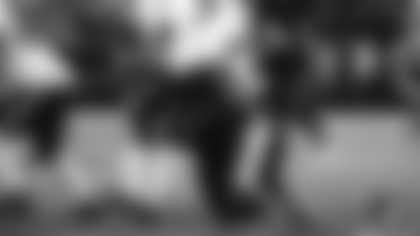
Three stats to know, and more, following the Jets' 19-9 loss to the LA Rams at MetLife Stadium on Sunday afternoon:
Pass D on a Roller Coaster
Going into the game, S Tony Adams hadn't had a start in four games or an interception in 14 games. TA ended both droughts, and his diving second-quarter interception was noteworthy, since Matthew Stafford hadn't thrown a pick in his previous 5 games and 192 passes.
That, coming the series after the Jets' 99-yard opening drive, seemed to bode well for the Green & White. It also signaled an upturn in the defense's theft production with its third INT in two games after getting just two INTs in the first 13 games.
Work still needs to be done. Adams was also credited with a pass defense on his interception, and that was the Jets' only downfield PD all game. The other two Jets PDs both came on the Rams' opening drive and both were behind the line on backfield bats of Stafford throws by Will McDonald and Haason Reddick.
Yet somehow, with only one downfield PD, one QB hit, no sacks, no Quinnen Williams or Michael Carter II and only a half-game from injured Sauce Gardner, the Jets pass defense still held up against Stafford, who passed for just 110 yards, his lowest total in a full-game start in six seasons and third-lowest in his long career. Congrats to D.J. Reed, Brandin Echols, Isaiah Oliver, Chuck Clark, Ashtyn Davis, Adams and all who somehow kept the Rams' dangerous passing game in check.
The Gift of Significantly Shorter Fields
This should surprise nobody, considering that the Rams started drives at the Jets' 33 (after a failed fourth-down conversion), 21 (after the Aaron Rodgers stripsack), 46 (after another loss on downs) and 13 (after Xavier Gipson's muffed punt). But those starting drives led to an almost insurmountable average drive start imbalance. The Rams started their eight series on average from their 46.6-yard line, the Jets started their seven drives from their 26.1.
The 46.6 is the fourth-best drive start by an opponent in the last 35 seasons of Jets football. The 20.5-yard difference between drive starts is the opponents' 10th-best in that span. Put another way, since 1990, when the opponents are plus-20 in drive start differential, the Jets' record is 1-11 (only win: 10-6 at the Giants in 1993). When the Jets are 20-plus, their record is 10-0. Holiday lesson for every season: Don't give opponents better short fields than they gift-wrap for you.
Time Was on the Jets' Side (Until It Wasn't)
Aaron Rodgers won't be happy to know he was another part of Jets history, with his direction of monster drives of 8:22 (and 99 yards) to start the game and 9:45 to open the third quarter. As the QB said of the offense being able to score after only two of their seven series, "In a game where there's only a few possessions, you've got to score every possession."
Still, long drives are good, as long as you score at the end of them, for keeping the ball out of a tough opponent's offensive mitts and wearing away at the other team's determination. So even though it's cold comfort, the Rams game was the first in Jets history in which they mounted two offensive drives of 8:00-plus.













